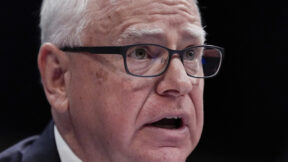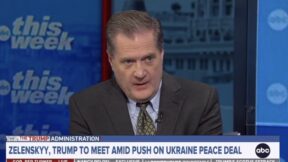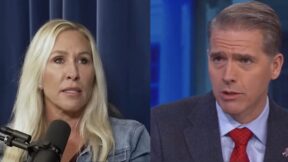Chris Wallace Goes At Nikole Hannah-Jones for Claim Greatest Generation ‘Violently Suppressed’ Black Voters in Heated CNN+ Exchange
CNN+ host Chris Wallace and 1619 Project author Nikole Hannah-Jones went at it over Hannah-Jones’ claim that the “Greatest Generation” was also culpable in “brutally suppressing democracy” for Black people.
Hannah-Jones and Wallace had a mutually warm and respectful discussion on the latest episode of the CNN+ series Who’s Talking to Chris Wallace, but it was also a conversation that Wallace himself described as “a little heated” at times.
Much of the interview centered around Hannah-Jones’ essay and book on the 1619 Project, including one passage that Wallace particularly objected to.
“Without the idealistic strenuous and patriotic efforts of black Americans, our democracy today would most likely look very different. It might not be a democracy at all,” Wallace read. “We like to call those who lived during World War Two, the Greatest Generation, but that allows us to ignore the fact that many of this generation fought for democracy abroad, while brutally suppressing democracy for millions of American citizens.”
“Again, I am in no way minimizing our terrible racial legacy. But in some of these things, aren’t you overstating?” Wallace asked.
Hannah-Jones did not agree, and told Wallace “if you have half of the country, where it’s in some states majorities, in many other states pluralities, 25% of the population, 40% of the population cannot vote, have their vote violently suppressed, where they’re a single one-party, one-race rule in a region where about 30% of the population is Black. Would you consider that democracy?”
Wallace cited the period during which women were not allowed to vote, and Hannah-Jones said “We weren’t a democracy, then either — half of the population can’t vote. I don’t know how you define democracy. But I don’t define that as democracy.”
“I agree with that. I’m just not sure that I would say that if it weren’t for Blacks, that wouldn’t be a democracy at all,” Wallace said.
Things got a little more heated when Wallace zeroed in on his main objection:
CHRIS WALLACE: Well here here’s where I take some objection. You’re talking about if you say the country that we were fighting for democracy overseas, and we were not living in, walking the walk, talking the talk at home, I completely agree with you. But you specifically say the Greatest Generation brutally suppress it, many of this generation brutally suppressing democracy for millions of Americans. To me, and I think Tom Brokaw when he originally wrote the book, The Greatest Generation, was talking about 20-year-olds, 30-year-olds who came out of the farm fields of the Midwest, who came out of ethnic neighborhoods in Brooklyn and South Philly and storm the beaches of Normandy and and, you know, fought to defeat the most, the worst regime, I would argue in, in world history. And to say that they were 20, 30 year olds, the country was brutally suppressing Blacks, but the Greatest Generation wasn’t.
NIKOLE HANNAH-JONES: Well, they were.
CHRIS WALLACE: No, they weren’t, you don’t be telling me that a farm, that a kid coming off a farm in Indiana or a kid who came from Brooklyn, is was suppressing Black people.
NIKOLE HANNAH-JONES: Indiana has the largest population of the Klan in the United States. The Klan was raised, was reached first in Indiana.
CHRIS WALLACE: I understand but that wasn’t the 20-year-old kid who —
NIKOLE HANNAH-JONES: You don’t think 20-year olds were in the Klan?
CHRIS WALLACE: I didn’t think many of them were, no.
NIKOLE HANNAH-JONES: I mean, I don’t know what evidence you have of that.
CHRIS WALLACE: Well, what evidence do you have that they were, since you wrote it.
NIKOLE HANNAH-JONES: I didn’t argue that they were, you’re saying that they were.
CHRIS WALLACE: You said many of this generation was brutally suppressing democracy for millions of Americans.
NIKOLE HANNAH-JONES: And that’s factually inaccurate how? Many of that generation work? Do you think that the only people —
CHRIS WALLACE: You think that —
NIKOLE HANNAH-JONES: Go ahead.
CHRIS WALLACE: I’m just asking. You think that’s a broad, a broad brush, that you’re willing to paint, the 20- and 30-year-olds who defended democracy, I’m not talking about the leaders. I’m not talking about the laws. I’m not talking about the country. I’m talking about the young people who risked their lives. For instance, on the beaches of Normandy, they were brutally suppressing African-Americans.
NIKOLE HANNAH-JONES: One, I think it’s a it’s a strange point to parse to, I don’t want I don’t think a 30-year-old is not a young person. But 30-year-old is a fully grown person who can serve in Congress, who can be the mayor, who can act, enact laws and policies — these are not children. These are not babies. We wouldn’t parse this, I think, if we were talking again about another country and say, well, well, yes, the government was violently suppressing but but everyone else, they weren’t. They were glorious. You don’t you, don’t do that. This is an argument about what our country was allowing. These were countrymen and they were fighting by the way in a Jim Crow military, they were fighting in an army in the Navy, where Black people were segregated, where Black people didn’t even have equal rights in the military. They were serving it and we all allow this I don’t understand this. This trying to parse off who gets guilt or who does not for our collective history. We have to be more honest about piercing that mythology not to destroy our country, but to if we can honestly face who we are, then we can actually become the country that we want to be. But we can’t do that by suppressing the truth and to ask a black person who’s whose view of the Greatest Generation was Black people are getting lynched. There were mass executions. I mean, right now they’re trying to pardon the mass execution of Black soldiers that happened in Texas, right? These this was our experience. And we were feeling more free going to Europe. And actually there are stories of, of military officials telling the Europeans how to treat Black soldiers so that they don’t come back feeling they’re going to have those same freedoms at home, we have to confront that. And by having these gauzy narratives about the Greatest Generation doesn’t help us confront the facts.
CHRIS WALLACE: That was good.
NIKOLE HANNAH-JONES: Oh, no, thank you very passionate about. And let me just say, I’m enjoying this or else, I wouldn’t be doing this.
CHRIS WALLACE: Good. I am. I am too. This is just what this is here for.
Watch above via CNN+.





Comments
↓ Scroll down for comments ↓